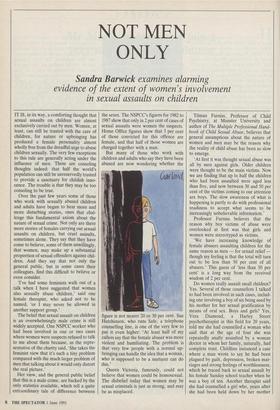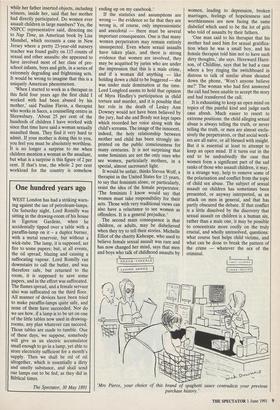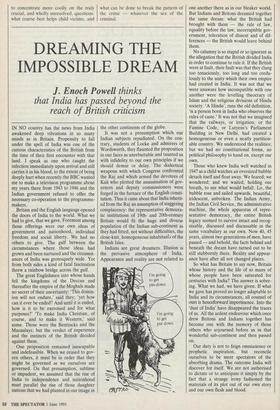NOT MEN ONLY
Sandra Barwick examines alarming
evidence of the extent of women's involvement in sexual assaults on children
IT IS, in its way, a comforting thought that sexual assaults on children are almost exclusively carried out by men. Women, at least, can still be trusted with the care of children, for nature or upbringing has produced a female personality almost wholly free from the dreadful urge to abuse children sexually. The very few exceptions to this rule are generally acting under the influence of men. These are consoling thoughts indeed: that half the world's population can still be unreservedly trusted to provide a sanctuary for childish inno- cence. The trouble is that they may be too consoling to be true.
Over the past few years some of those who work with sexually abused children and adults have begun to hear more and more disturbing stories, ones that chal- lenge this fundamental axiom about the nature of sexual crime. Not only are there more stories of females carrying out sexual assaults on children, but cruel assaults, sometimes alone. They say that they have come to believe, some of them unwillingly, that women, may make up a substantial proportion of sexual offenders against chil- dren. And they say that not only the general public, but in some cases their colleagues, find this difficult to believe or even consider.
`I've had some feminists walk out of a talk when I have suggested that women also sexually abuse children,' said one female therapist, who asked not to be named, 'or I may never be allowed in another support group.'
The belief that sexual assault on children is an overwhelmingly male crime is still widely accepted. One NSPCC worker who had been involved in one or two cases where women were suspects refused to talk to me about them because, as the repre- sentative of the charity said, 'She takes the feminist view that it's such a tiny problem compared with the much larger problem of men that talking about it would only distort the real picture.'
Her view, and the general public belief that this is a male crime, are backed by the only statistics available, which tell a quite extraordinary tale of difference between the sexes. The NSPCC's figures for 1982 to 1987 show that only in 2 per cent of cases of sexual assaults were women the suspects. Home Office figures show that 3 per cent of those convicted for this offence are female, and that half of those women are charged together with a man.
But many of those who work with children and adults who say they have been abused are now wondering whether the figure is not nearer 20 or 30 per cent. Sue Hutchinson, who runs Safe, a telephone counselling line, is one of the very few to put it even higher: 'At least half of my callers say that the female abuser was more violent and humiliating. The problem is that very few people with a normal up- bringing can handle the idea that a woman, who is supposed to be a nurturer can do this.'
Queen Victoria, famously, could not believe that women could be homosexual. The disbelief today that women may be sexual criminals is just as strong, and may be as misplaced. Tilman Furniss, Professor of Child Psychiatry, at Munster University and author of The Multiple Professional Hand- book of Child Sexual Abuse, believes that general assumptions about the nature of women and men may be the reason why the reality of child abuse has been so slow to emerge.
`At first it was thought sexual abuse was all by men against girls. Older children were thought to be the main victims. Now we are finding that up to half the children who had been assaulted were aged less than five, and now between 30 and 50 per cent of the victims coming to our attention are boys. The slow awareness of what is happening is partly to do with professional readiness to accept what seems to be increasingly unbelievable information.'
Professor Furniss believes that the reason why boy victims of abuse were overlooked at first was that girls and women were stereotyped as victims.
`We have increasing knowledge of female abusers assaulting children for the same reason as men — for sexual relief though my feeling is that the total will turn out to be less than 50 per cent of all abusers.' This guess of 'less than 50 per cent' is a long way from the received wisdom of 2 per cent.
Do women really assault small children? Yes. Several of those counsellors I talked to had been involved in such cases, includ- ing one involving a boy of six being used by his mother for her sexual gratification by means of oral sex. Boys and girls? Yes, Vera Diamond, a Harley Street psychotherapist in this field for 20 years, told me she had counselled a woman who said that at the age of four she was repeatedly anally assaulted by a woman doctor in whom her family, naturally, had complete trust. Childline instanced a case where a man wrote to say he had been plagued by guilt, depression, broken mar- riages and strong feelings of worthlessness, which he traced back to sexual assault by his female Sunday school teacher when he was a boy of ten. Another therapist said she had counselled a girl who, years after she had been held down by her mother while her father inserted objects, including scissors, inside her, said that her mother had directly participated. Do women ever assault children in large numbers? Yes, the NSPCC representative said, directing me to Nap Time, an American book by Lisa Manshel, which recounts a case in New Jersey where a pretty 23-year-old nursery teacher was found guilty on 115 counts of sexual and other assaults: she appeared to have involved most of her class of pre- school infants, boys and girls, in a series of extremely degrading and frightening acts. It would be wrong to imagine that this is a uniquely American phenomenon.
'When I started to work as a therapist in this field four years ago the first child I worked with had been abused by his mother,' said Pauline Flavin, a therapist who works in Saccs, a counselling centre in Shrewsbury. 'About 25 per cent of the hundreds of children I have worked with since that time have said a woman sexually assaulted them. They find it very hard to admit. If your mother is doing this to you, you feel you must be absolutely worthless. It is no longer a surprise to me when children mention a woman as the assailant, but what is a surprise is this figure of 2 per cent. If that's true, the whole 2 per cent workload for the country is somehow ending up on my casebook.'
If the statistics and assumptions are wrong — the evidence so far that they are wrong is, of course, only impressionistic and anecdotal — there must be several important consequences. One is that many women perpetrators may remain entirely unsuspected. Even where sexual assaults have taken place, and there is strong evidence that women are involved, they may be acquitted by juries who are under the impression that this is a male crime, and if a woman did anything — like holding down a child to be buggered — she was under male domination at the time. Lord Longford seems to hold that opinion of Myra Hindley's participation in child torture and murder, and it is possible that her role in the death of Lesley Ann Downey would not have been believed by the jury, had she and Brady not kept tapes which recorded her voice along with the child's screams. The image of the innocent, indeed, the holy relationship between mother and child has been strongly im- printed on the public consciousness for many centuries. It is not surprising that some feminists are not the only ones who see women, particularly mothers, in a special, almost sacrosanct light.
It would be unfair, thinks Steven Wolf, a therapist in the United States for 15 years, to say that feminists alone, or particularly, resist the idea of the female perpetrator. 'The feminists I know would say that women must take responsibility for their acts. Those with very traditional views can also have a reluctance to see women as offenders. It is a general prejudice.'
The second main consequence is that children, or adults, may be disbelieved when they try to tell their stories. Michelle Elliot of the charity Kidscape, who used to believe female sexual assault was rare and has now changed her mind, says that men and boys who talk of childhood assaults by women, leading to depression, broken marriages, feelings of hopelessness and worthlessness are now facing the same disbelief which used to be the lot of girls who told of assaults by their fathers.
`One man said to his therapist that his mother had used him for sexual gratifica- tion when he was a small boy, and his female therapist told him not to have such dirty thoughts,' she says. Hereward Harri- son, of Childline, says that he had a case where a boy ringing the switchboard in distress to talk of similar abuse shouted down the phone, 'Won't anyone believe me?' The woman who had first answered the call had been unable to accept the story and had transferred the call.
It is exhausting to keep an open mind on topics of this painful kind and judge each case afresh. Much easier to resort to extreme positions: the child alleging sexual abuse is always telling the truth, or never telling the truth, or men are almost exclu- sively the perpetrators, or that social work- ers are all naïve, or all blessed with insight. But it is essential at least to attempt to keep an open mind. If it turns out in the end to be undoubtedly the case that women form a significant part of the sad ranks of those who assault children, it may, in a strange way, help to remove some of the polarisation and conflict from the topic of child sex abuse. The subject of sexual assault on children has sometimes been presented, or anyway interpreted, as an attack on men in general, and that has partly obscured the debate. If that conflict is a little dissolved by the discovery that sexual assault on children is a human sin, rather than a male one, it may be possible to concentrate more coolly on the truly crucial, and wholly unresolved, questions: what course best helps child victims, and what can be done to break the pattern of the crime — whatever the sex of the criminal.
'Mrs Pierce, your choice of this brand of spaghetti sauce contradicts your previous purchase history.' to concentrate more coolly on the truly crucial, and wholly unresolved, questions: what course best helps child victims, and what can be done to break the pattern of the crime — whatever the sex of the criminal.




















































 Previous page
Previous page